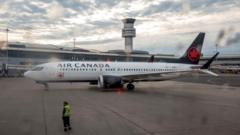Will Air Canada Start Canceling Flights Due to Upcoming Strike?

Air Canada's Flight Suspension: A Comprehensive Analysis
In a significant development for travelers and the aviation industry, Air Canada, the nation's largest airline, is poised to suspend flights amid an escalating labor disagreement. This situation arises following a 72-hour strike notice issued by the Canadian Union of Public Employees (CUPE), representing approximately 10,000 flight attendants. As the clock counts down to the planned strike, understanding the implications for passengers and the airline is crucial.
The Context of the Strike
The friction between Air Canada and CUPE stems from stalled contract negotiations, which have reportedly been ongoing for over eight months. CUPE has expressed frustration with what they describe as Air Canada's unwillingness to adequately address critical issues, particularly concerning wages and unpaid work. In contrast, Air Canada maintains that it has made generous offers, including a proposed total compensation increase of 38% over four years.
Timeline of Events Leading to the Suspension
- Early Negotiations: Contract talks began with both parties aiming to reach an amicable agreement.
- Strike Notice Issued: CUPE issued a 72-hour strike notice, signaling the potential for significant disruptions in service.
- Flight Cancellations Begin: Air Canada will start canceling flights, with a full cessation expected by Saturday.
Potential Impact on Travelers
The impending strike poses a major risk to passengers and the airline's operations. Air Canada serves 130,000 customers daily, and the suspension will undoubtedly disrupt travel plans for many, especially during the peak summer season.
Who Will Be Affected?
The flight disruptions will affect a wide range of travelers, including:
- Domestic passengers within Canada
- International travelers connecting through Air Canada's extensive network
- Tourists and business travelers relying on timely flights
Air Canada's Response
In light of the strike notice, Air Canada has taken proactive measures. The airline has advised passengers without confirmed flights to refrain from going to the airport, highlighting its commitment to customer communication during this uncertain time. Furthermore, the airline has made arrangements with other carriers to provide alternative travel options for affected customers.
Understanding the Union's Position
CUPE's stance is rooted in the belief that the airline's offers do not meet the financial realities faced by flight attendants. The union argues that Air Canada's compensation proposal falls short of inflation rates and market standards, leaving flight attendants unpaid for essential duties such as boarding and waiting times.
Union's Call to Action
CUPE has rallied its members, emphasizing solidarity throughout the negotiation process. Earlier this month, a staggering 99.7% of union members voted in favor of striking if necessary, reflecting the sentiment among flight attendants regarding their working conditions and compensation.
The Broader Implications for the Airline Industry
The potential strike and subsequent flight suspensions highlight larger issues within the airline industry, particularly concerning labor relations and the treatment of employees. As airlines navigate post-pandemic recovery, ensuring fair compensation and working conditions for staff is imperative for sustainable operations.
Lessons for Other Airlines
Other airlines observing this situation may glean valuable insights, including:
- The importance of transparent negotiations with employee unions
- Proactively addressing employee concerns to avoid disruptions
- Understanding the customer impact of labor disputes and preparing accordingly
What to Expect in the Coming Days
As the strike deadline approaches, passengers must stay informed about their travel plans. Air Canada has committed to notifying customers whose flights are canceled and providing full refunds. However, travelers should anticipate potential delays in securing alternative arrangements, as the situation evolves.
Travel Tips During the Disruption
If you find yourself impacted by the flight suspensions, consider the following tips:
- Check your flight status regularly through Air Canada's official channels.
- Have a backup travel plan in place, including alternative routes or carriers.
- Stay updated on any communications from the airline regarding refunds or rescheduling.
Conclusion: Navigating Uncertain Skies
The situation surrounding Air Canada's flight suspensions serves as a stark reminder of the complexities inherent in labor relations within the aviation sector. As both the airline and the union navigate this impasse, the impact on thousands of travelers looms large. For those affected, staying informed and prepared will be key to navigating the disruptions ahead.
FAQs
What are the reasons for the flight attendants' strike?
The strike is primarily due to unresolved issues related to wages and unpaid work as the union feels that Air Canada's offers do not meet the necessary compensation standards.
When will the flight suspensions begin?
Flight suspensions are set to begin gradually, with a complete cessation of flying expected by Saturday at 01:00 EST.
What should passengers do if their flight is canceled?
Passengers whose flights are canceled will be notified by the airline and will receive a full refund. They should also check for alternative travel options provided by Air Canada.
As we witness these developments unfold, it’s crucial to consider how labor relations could reshape the future of air travel. Will airlines find a way to balance operational needs with employee satisfaction? #AirCanada #FlightSuspension #LaborRelations
```Published: 2025-08-13 17:07:03 | Category: wales



